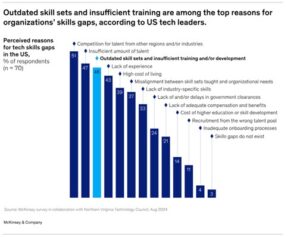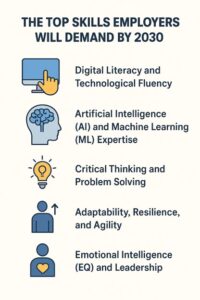
As the nature of work keeps changing fast, with the pace being driven by technology and changing business demands, the skills sought-after by employers are also changing.
The future decade will require a fresh combination of technical knowledge, flexibility, and people skills from job candidates and working professionals. Knowing these new skill trends is important to succeed in careers.
In this blog, we discuss the most important skills employers will look for in the next ten years, supported by recent research and figures, and explain how acquiring these skills can future-proof your career.
According to the World Economic Forum’s Future of Jobs Report 2025, rapid automation, artificial intelligence, and digital transformation continue to reshape the job market globally.
By 2030, 59% of workers will need reskilling; however, only about half currently have sufficient access to training opportunities. This gap emphasises the urgent need for professionals to adopt the right skills now for sustained employability and career growth.

Read more about: The future of skills-based education in universities

It is estimated that nearly 70% of the early careers will need digital skills, such as the capacity to work on AI-enabled systems, data analysis, cybersecurity, cloud computing, and so on. Even non-tech work positions will need virtual collaboration and project management tools familiarity.
Becoming proficient in AI and ML is no longer the domain of technical experts alone. Since 77% of companies are already looking into implementing AI, those who can apply these technologies to enhance operations and decision-making will have a unique advantage. Data transformation, business analytics, and moral AI usage are some of the quickest-growing skills.
Employers value employees who can analyse complex situations, think strategically, and develop innovative solutions. This ability to take initiative and solve problems independently empowers teams to navigate uncertainty and thrive amidst change.
The capacity to pivot quickly and embrace continuous learning will be vital traits. Businesses increasingly seek workers who manage change gracefully, remain flexible, and continue to develop new skills—characteristics closely tied to long-term career resilience.
Automation may replace some tasks, but human-centred skills like empathy, communication, collaboration, and leadership remain irreplaceable. Remote work and global teams make these interpersonal skills even more critical for organisational success.
Importance of Soft skills in the Job Market & Role of Higher Education
At Exeed ECX, we understand how crucial it is for professionals to stay ahead in an ever-changing job market. Exeed ECX offers accredited programmes that align with the skills employers demand for the future.
Our international-level degree programmes cover trending topics like AI, Machine Learning, Data Analytics, Data Science, Business Intelligence, Business Management, etc with highly flexible learning methods.
The next workplace will require a holistic combination of digital savvy, problem-solving skills, flexibility, and emotional intelligence. In order to stay relevant and succeed in the economy of tomorrow, investing in these abilities today is imperative.
Adaptive, globally accepted programmes such as those provided by Exeed ECX set you up to tackle these challenges head-on with the knowledge and credentials that count.
Start building your future-ready skill set now and remain competitive in a rapidly evolving job landscape.
Explore Exeed ECX’s programmes here
How Universities are Adapting to the Changing Job Market